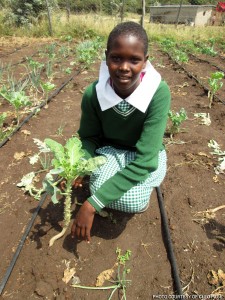
Dreaming of a Better Future: One Girl's Struggle to Get An Education
 When nine-year-old Elizabeth Kisemei told her parents that she wanted to go to school, they said ‘no.'
When nine-year-old Elizabeth Kisemei told her parents that she wanted to go to school, they said ‘no.'
She asked them again. And again, they said 'no.'
Elizabeth comes from a rural Maasai community of Sikirar. Her sheepherder parents tend their flock and sell their animals at the market. They relied on Elizabeth to take care of her three younger sisters and two younger brothers. Sending Elizabeth to school would jeopardize the family. They could not see the benefit.
Some dutiful eldest girls might shelve their dreams in the face of so much parental opposition, but Elizabeth couldn't accept her fate—especially after Free The Children added new classrooms to the dilapidated two-room school. She kept hearing from neighbours and students about all the opportunities it offered.
She asked her parents again, but they couldn't afford to lose her labour at home, she explains speaking through a translator in a soft voice, barely audible. Although she cared deeply for her siblings, education provided opportunities and would also keep her from becoming a child bride.
“If I didn't come to school, my father would give me to someone to marry.” Visibly embarrassed, she partially hides her face behind her hands while she speaks. As a dowry, she says, a husband-to-be would have given her father cows, goats and sheep.
Elizabeth decided to act on her own. She asked a neighbour, a teacher at the Sikirar Primary School, for help.

“Madame used herself as an example for why education is important,” says Elizabeth. “She said ‘I am teaching in the school so if you can also take the opportunity to go to school then you can be someone like me.'”
Together Elizabeth and the teacher went to the school and registered her as a student against her parent's wishes. Later, the teacher went and spoke to Elizabeth's parents, urging them to support Elizabeth's decision to go to school. They reluctantly relented.
In November 2011, Elizabeth started Grade 1, even though most of the children were several years younger than she was.
She has hopes for the future. “At least in my life there is a chance because I have gone to school.”
Now 12, Elizabeth is in Grade 3, the oldest in a class of nine-year-olds. Of the 53 students in her class, Elizabeth ranks sixth. She loves reading books in Swahili and dreams of being a doctor—a goal many students share because it a profession that commands power, respect and money.
Elizabeth is part of the environmental club, helping plant flowers in the schoolyard and vegetables in the school garden.
Because of the club, she now teaches her parents about agricultural practices, with plans of starting a vegetable garden at home so they will have a regular supply of fresh vegetables to eat.
Since her parent's initial refusal to send her to school, much has changed. Her parents now see how beneficial the Free The Children school has been for Elizabeth. While her marriage would have brought in many goats, cows and sheep for her family, when she finishes her education, Elizabeth will have the potential to get a job where she would earn enough to buy many more animals.
They also agree with school because they can see how happy it has made their daughter. “It is the change in myself,” she says.
By Kathleen Lane-Smith and Shelley Page, Free The Children